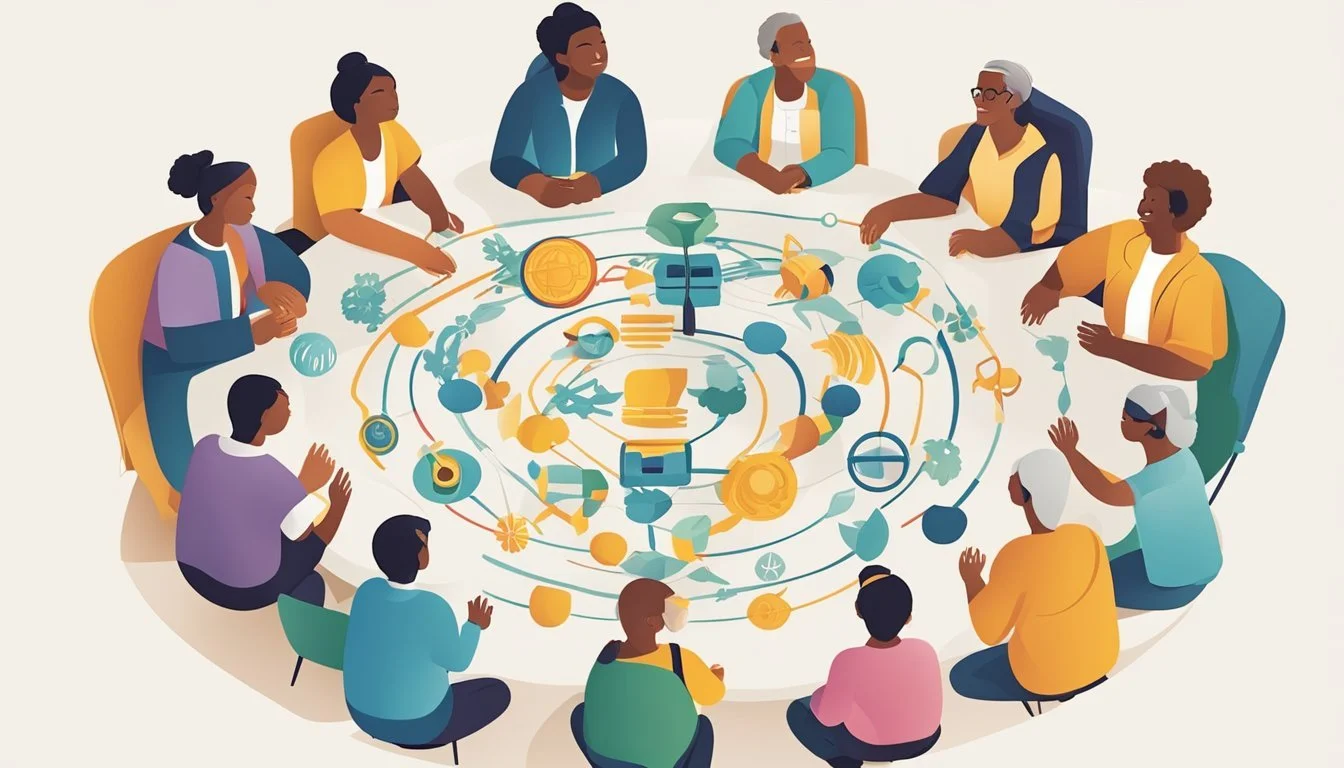6 Tips for Navigating Friendships When You're at Different Stages of Life
Strategies for Stronger Bonds
Maintaining friendships through various life stages can be challenging yet rewarding. People often find themselves on different paths, whether it's pursuing higher education, starting a new career, or getting engaged. These significant changes can sometimes create a sense of distance between friends.
Understanding how to navigate these differences is essential for preserving long-lasting and meaningful relationships. By focusing on the core elements that initially brought friends together and adapting to each other's evolving circumstances, it's possible to maintain a strong bond. This article will provide valuable insights on how to stay connected with friends, no matter where life leads.
1) Communicate Openly
Effective communication is crucial in maintaining friendships across different life stages. When friends are facing varied experiences, open dialogue can bridge gaps and foster understanding.
Discussing your feelings and experiences can help friends understand each other's perspectives. This can prevent misunderstandings and ensure both parties feel heard and valued.
Regular check-ins, whether through texts, calls, or face-to-face meetings, keep the bond strong. They allow friends to share updates and stay connected despite busy schedules or life changes.
Listening actively is just as important as speaking. By giving full attention to what your friend is saying, you can gain insights into their life stage and provide meaningful support.
Being honest about your needs and boundaries fosters respect and trust. This transparency can help friends navigate differences and maintain a balanced relationship.
Open communication also involves asking questions and showing genuine interest in each other's lives. This can deepen the connection and reinforce the friendship, even when circumstances shift.
Learning to communicate openly is a key strategy for sustaining long-term friendships. It enables friends to grow together, adapt to changes, and remain supportive through various stages of life.
2) Respect Different Priorities
As friends progress through different stages of life, their priorities naturally shift. What was once a shared focus during college years might not align in adulthood. It's important to recognize these changes without judgment.
A friend's focus might be on building a career, while another might prioritize family life. Each path requires time and attention, and respecting these choices strengthens the friendship.
Open communication helps in understanding each other’s current focus. Expressing support and acknowledging these differences can prevent misunderstandings and foster a deeper bond.
It's crucial to remain flexible. Adaptability ensures that both parties feel valued, regardless of where they are in life. Embracing different priorities can enrich the friendship, offering fresh perspectives and experiences.
Sometimes, activities or meet-ups may need to change to accommodate new schedules. By showing understanding and being willing to adjust, the friendship remains robust and meaningful.
Respect for each other's evolving priorities creates a foundation of mutual respect. This respect is vital for sustaining long-term friendships. Recognizing and valuing these differences highlights the depth of the connection and the resilience of the friendship.
3) Embrace Change
Navigating friendships at different life stages requires a flexible mindset. Embracing change means recognizing that relationships will naturally evolve. Each phase of life brings unique experiences and challenges that can re-shape how friends connect and communicate.
Acknowledging that change is inevitable reduces stress and disappointment. It allows individuals to appreciate the growth and maturity within their friendships. Maintaining an open heart and mind helps in adapting to these transitions smoothly.
Effective communication plays a vital role in embracing change. Friends should engage in open and honest dialogues about their evolving needs and priorities. This helps in understanding each other's perspectives and fosters deeper connections.
Embracing change also involves letting go of rigid expectations. This flexibility allows for the continued growth of the friendship, accommodating differences in career paths, relationship statuses, and personal development.
Engaging in supportive actions, such as celebrating milestones or offering a listening ear, strengthens bonds. By being present and attentive, friends can navigate life's changes together, reinforcing their support system.
For more insights on handling changes in friendships, explore this article about adapting to friendship dynamics.
4) Celebrate Milestones Together
Recognizing and celebrating milestones is essential for maintaining strong friendships, regardless of the different life stages individuals may be experiencing.
Birthdays, anniversaries, and career achievements are excellent opportunities to show support and joy in your friends' successes. Attending these celebrations together reinforces the bond, demonstrating that you value their happiness as much as your own.
Even if you can't be physically present, sending a thoughtful gift or arranging a virtual celebration can bridge the gap. This ensures you remain part of each other's important moments, despite your different paths.
Sharing these experiences builds a sense of shared history and mutual respect. It's a reminder that, no matter where life takes you, you remain connected and supportive of each other's journeys.
By actively participating in your friends' milestones, you help foster a deeper connection. These shared moments become cherished memories, strengthening your relationship regardless of the challenges posed by differing life stages.
5) Offer Support Without Judgment
One of the crucial aspects of maintaining strong friendships is offering support without judgment. When friends are at different life stages, being non-judgmental becomes even more essential.
Being a safe space for someone means actively listening to them without adding shame, guilt, or dismissive reactions. This can make a significant difference in how comfortable they feel opening up.
Non-judgmental support allows friends to express themselves freely, which can greatly enhance emotional well-being. Judgment can make individuals feel misunderstood and hesitant to share their experiences.
Positive affirmation is another way to support without judgment. Focusing on supportive and encouraging comments can help friends feel stronger and more validated.
Active listening is also key. This involves not just hearing the words, but understanding the emotion and intent behind them. It's about being present in the moment.
Offering practical help, like running errands or lending a hand with tasks, can show support without intruding. Simple messages of care and concern can also make a big difference.
By fostering a supportive environment free from judgment, friendships can thrive even when life stages differ, making the bonds stronger and more resilient. For more detailed advice, visit Judgement-Free Advice: How to Offer Support.
6) Find Common Interests
Strengthening friendships amidst different life stages often involves identifying shared activities or hobbies. When friends find common interests, it builds a bridge over any gaps created by life changes. Whether it's a favorite sport, a love for cooking, or a shared passion for movies, these commonalities provide areas to connect.
It's essential to actively seek out and nurture these interests. By engaging in activities both friends enjoy, they create new memories, reinforcing their bond. This intentional effort can help relationships thrive despite being at different stages of life.
Friends should also remain open to exploring new interests together. While they may already share a few hobbies, trying something new can be an exciting way to reconnect. For example, picking up a new sport, attending a class, or even starting a book club can provide fresh opportunities for interaction.
It is important to communicate openly about what each person enjoys. Understanding each other's preferences can help in selecting activities that everyone finds enjoyable. This approach ensures that the time spent together is meaningful and enjoyable for all parties involved.
In sum, finding and cultivating common interests is a practical way to maintain and strengthen friendships. It helps friends stay connected and engaged, even when their personal journeys differ significantly. For more tips on nurturing friendships, check out this helpful guide.
Understanding Different Life Stages
Different stages of life come with unique experiences and challenges that can affect friendships. Recognizing these life changes can help maintain and strengthen those connections.
Defining Life Stages
Life stages can be broadly categorized into childhood, adolescence, young adulthood, middle adulthood, and older adulthood.
Childhood involves growth and learning, largely shaped by family and early school experiences.
Adolescence is marked by identity exploration, peer influence, and independence from parents.
Young adulthood often includes higher education, career beginnings, and forming intimate relationships.
Middle adulthood generally involves parenting, career advancement, and planning for retirement.
Older adulthood may bring retirement, health considerations, and reflecting on past accomplishments.
Understanding these stages helps explain how priorities and lifestyles may change over time.
Common Challenges in Different Stages
Each stage presents distinct challenges for maintaining friendships.
In childhood and adolescence, frequent changes in interests and schools can make it hard to sustain long-term friendships.
Young adults may struggle with time management due to education, careers, and new relationships. Friends may drift apart as they pursue diverse goals and locations.
Middle adulthood often demands juggling between family responsibilities, career pressures, and social life, making it challenging to maintain connections.
Older adults might face difficulties due to health issues, mobility restrictions, or losing friends. They may also find it challenging to form new friendships.
Acknowledging these challenges can foster empathy and adaptability, crucial for sustaining relationships across various life stages.
Communication Strategies
Effective communication is crucial for maintaining friendships when individuals are at different stages in their lives. Essential strategies include active listening, expressing one's needs clearly, and setting appropriate boundaries.
Active Listening
Active listening involves more than just hearing words; it requires giving undivided attention and showing genuine interest. When friends are going through different life phases, it’s important to validate their experiences by making eye contact, nodding, and providing feedback.
Examples of Active Listening:
Paraphrasing: Repeating back what the other person has said to demonstrate understanding.
Asking Open-Ended Questions: Stimulating deeper conversation and showing curiosity.
Avoiding Interruptions: Letting the friend finish their thoughts before responding.
Practicing these techniques helps in acknowledging the friend's situation and fosters a deeper emotional connection.
Expressing Needs
Expressing needs clearly and respectfully can prevent misunderstandings. When friends' lives diverge, discussing what each person requires from the friendship is vital.
Methods for Expressing Needs:
Use “I” Statements: “I feel” or “I need” statements help articulate personal needs without placing blame.
Be Specific: Clearly explain what is needed, whether it is more frequent communication or understanding during busy times.
Emotional Honesty: Sharing true feelings without fear strengthens trust.
Clear expression ensures both friends understand and support each other’s needs effectively.
Setting Boundaries
Setting boundaries protects the friendship from strain due to misaligned expectations. Each stage of life comes with its own set of responsibilities and time constraints, making boundaries essential.
Strategies for Setting Boundaries:
Discuss Limitations: Be upfront about availability and what can be realistically offered in the relationship.
Respect Differences: Recognize and honor the friend’s boundaries as much as one's own.
Regular Check-Ins: Have ongoing dialogues about boundaries to adapt to evolving needs.
By establishing and respecting boundaries, friends can maintain a healthy and supportive relationship despite differing life stages.





